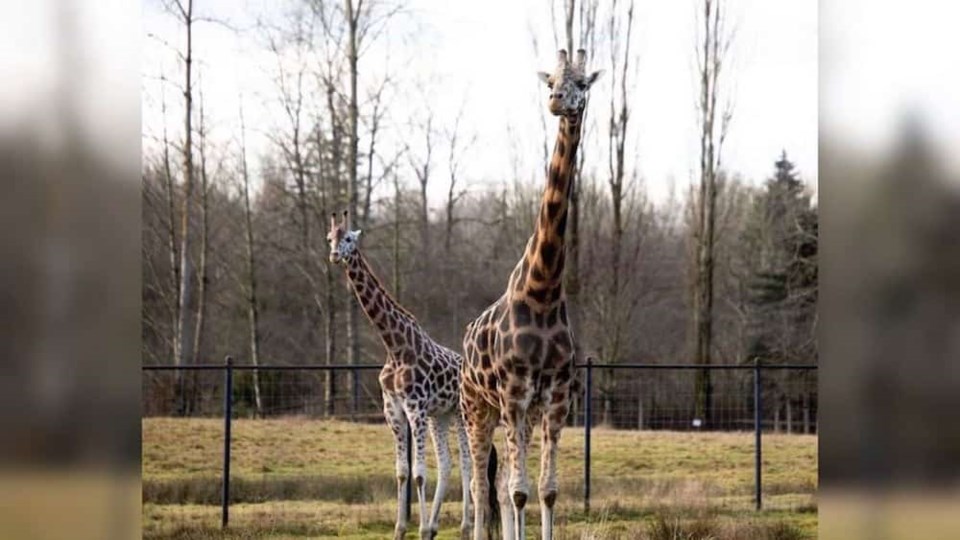The Greater Â鶹´«Ã½Ó³»Zoo is planning a massive, multi-million dollar renovation over the next five years, but animal rights activists worry that the expansion isn't in the best interests of the animals.
In spite of the COVID-19 pandemic, Serge Lussier, General Manager of the Greater Vanouver Zoo, says he hopes to complete the zoo's new $1.8 million entrance this year.
"I arrived as the new manager of the zoo on Sept. 1 last year," Lussier tells Â鶹´«Ã½Ó³» in a phone call. "I have over 40 years experience in the field, and I came to Â鶹´«Ã½Ó³»to create the zoo of the future."
According to Lussier, the Greater Â鶹´«Ã½Ó³»Zoo had to lay off its staff that deal strickly with the public. However, all of the staff that deal with animal care and health are still at work.
Lussier adds that the old zoo entrance was demolished a month ago, and he's optimistic that the zoo will be open by mid-summer. He adds that the zoo is also planning to build a new conservation and observation centre over the summer, which he thinks will be completed this year, too.
As for the vision of the new zoo, Lussier says it will have a Canadian and an African Safari Park. In the Canadian one, he says visitors will find a number of species that call British Columbia home.
"I believe in big spaces - in discovery, experience and natural habitat," explains Lussier. "When I say safari I don't mean that people will drive their own cars in the park. We'll have a way to transport them through it."
Ultimately, Lussier says he wants to connect people to nature. As such, he remarks that, "The zoo of the future eliminates fences and is as close as possible to the animal's natural habitat."
Lussier adds that the re-imagined feline complex will offer an observatory so that people can view the animals from up above them. Cohabitation between species, such as zebras, ostriches, and giraffes, will be common. He notes that this is the way animals live in the wild - where they compete for space and food.
"It will be a piece of Africa in the heart of B.C.," describes Lussier. "There will also be an African village."
And how much will this ambitious project cost?
A cool $10 million to $22 million, says Lussier.
"The goal is not to acquire many new animals, but there will be a few new species," explains Lussier. "Of course, we'll have a breeding program for endangered species."
In December 2019, the Â鶹´«Ã½Ó³»Humane Society called for significant reform at the Greater Â鶹´«Ã½Ó³»Zoo. Commissioned by the VHS from Zoocheck, the report found that many of the GVZ's animals were living in unsuitable conditions, which include under-sized cages that restrict them from their natural behaviour. While the report notes that the GVZ has made positive changes since the 1997 report was published, it states that, "some longstanding issues remain problematic and should be addressed."
The report also called for the GVZ to remove animals that aren't suited to B.C.'s climate, as well as any animals that it can't accommodate in a way that better meets their overall needs.
Victoria Shroff, Animal Rights Lawyer, told V.I.A. in a phone call that she also worries that many of the animal's best interests won't be served in the zoo's new vision. While the attraction will be bigger, she wonders if the expansion will really help the animals.
"They are doing a major overhaul there. It might give the animals more space, which is great, but many of these animals simply aren't suited to the climate," explains Shroff.
Shroff mentions the African Safari Park, and how almost every animal in it wouldn't be suited to B.C.'s climate. She notes that most of the animals come from extremely hot, dry deserts, and that the Lower Mainland is simply not like their natural habitat. She also mentions Lucy, a 44-year-old African elephant that has lived at the Edmonton Valley Zoo since 1977 and has a multitude of health problems. As the world's 'most northerly' elephant, many activists claim the environment has played a major part in her poor health.
Shroff also worries about the zoo's breeding program, which the Â鶹´«Ã½Ó³»Humane Society has also stated should stop.
Lussier states that B.C. has the warmest climate in Canada and that there are, "similarities between the Lower Mainland and Africa." Specifically, he notes that the Serengeti also has a long rainy season.
"Africa is a few degrees warmer but animals adapt," explains Lussier. "There are ways to make sure they have heated spaces if it is cold, too."
Lussier adds that once the COVID-19 pandemic ends, he believes British Columbians will come together stronger and that the enviornment will have, "more room in our hearts." He adds that the Greater Â鶹´«Ã½Ó³»Zoo will be a fantastic place to bring the whole family.



